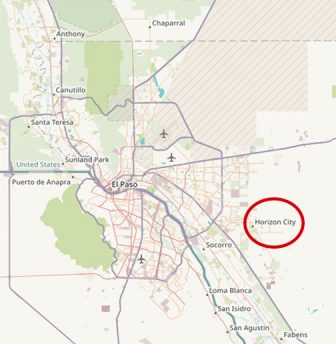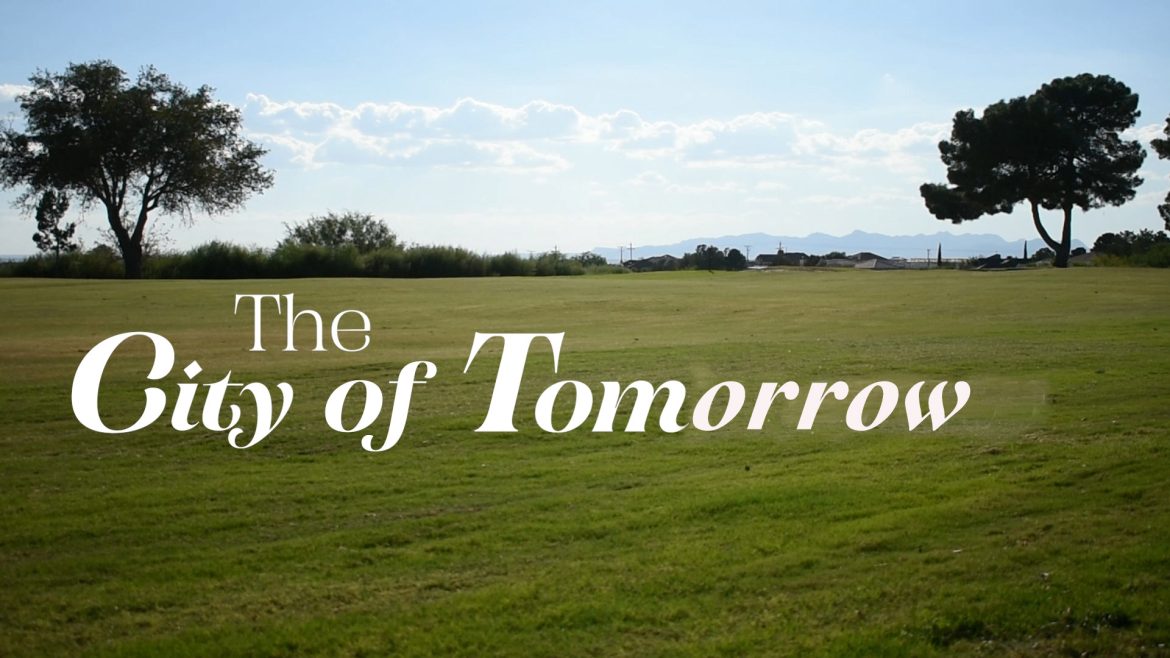Horizon City, Texas, is a small town on the far east side of El Paso County. It has a golf course, a tiny lake, green grass, a pool, and a restaurant with a tennis court.
The golf course is one of the only reminders that 40 years ago, this desert spot was once planned to be the “City of Tomorrow” with a population of 1.5 million people, designed by a famous Brazilian architect. The idea was to build up around an upscale retirement community like Sun City in Arizona.
“Part of the city was going to be a retirement homes and duplexes and then the other side was going to be mobile homes for people who want to retire that way,” said Chris Babcock the former editor of the Horizon City News. “It was going to be interconnected with golf carts and in golf courses.
But today, Horizon City has less than 20, 000 people, most of whom are under the age of 60.
There’s still a large area of open desert past the eastern edge of town.
So, what happened to the city of tomorrow?
From Dreamland to Zombie Lots
Retirement based communities first started in the U. S. in the 1920s, and they were originally very exclusive and mostly concentrated in Florida. Then, in the 1960s and 70s, we saw a boom in the growth of retirement communities throughout the country.
Some of the most popular were in warmer climates, like Arizona and California, that attracted older Americans looking to leave behind the cold winters of the northern cities.

Map indicating where Horizon City is in El Paso County. Source: Open Street Maps
So, it wasn’t a surprise when developers from Chicago and Tucson announced plans in 1959 for West Texas. They pitched an opportunity to build a retirement mecca in the desert outside of El Paso.
Arthur Rubloff and Co. of Chicago teamed up with the Horizon Land Corps of Tucson and brought several El Paso business people on board to invest in what they called the “City of Tomorrow.”
“They put up what you can see – the city hall, there was a little hotel next to it, and then there was the golf course,” Babcock said.
The chief planning and design consultant on the project was Lúcio Costa, the modernist architect who designed Brazil’s capital city of Brasilia. Horizon City, it seemed, was lined up for a fantastic future.
But, while retirement communities in other places were thriving, Horizon City sat mostly empty over time, like a desert mirage. There were a lot of roads, but not much else.
The illusion was busted in 1979 when Horizon Land Corp. was accused of fraud by the Federal Trade Commission for selling “virtually worthless desert land” to “unsuspecting” consumers. The developers sold residential and commercial lots to investors who never built on them. Over time the lots were sold to others, who also didn’t develop them.
“So, a lot of these lots, what they call them is zombie lots, a lot of these lots are little holes all around Horizon, and even inside Horizon proper, where they can’t find out who originally owned it,” Babcock said.
So, everything just sat empty. For decades. That is, until the 1990s. A TV commercial from the 90’s shows the city’s pivot away from retirees to promote itself as a fun, friendly and clean place for young families to live.
A new vision develops
Irene De La Torre grew up in nearby Socorro, Texas, an old farming community in El Paso County’s Lower Valley. She was impressed by the few homes built in the early days of Horizon City which the locals refer to as before the Walmart opened in 2014.
“I remember as a young girl, I mean, coming, cruising down here and seeing the houses and thinking, wow, these are mansions,” De La Torre said. She eventually moved there herself. “You know what I always thought it’s a nice area. It’s quiet. It’ll be a nice place to just live, never expecting the boom that we’ve seen in recent years. “
De la Torres is retired now, but she used to have to commute 20 minutes to work at an elementary school in Clint, Texas.
Michael Hernandez, former economic director for Horizon City, said he believes the area was initially developed as a bedroom community, but has evolved into more of a small town community..
Still, because of its location on the far east side of the county, Horizon residents often have to commute to work in El Paso, because there aren’t a lot of jobs in town.
“I think that’s one of the guiding forces behind us trying to support that town center at the intersection of Darrington and Horizon,” Hernandez said.
He’s talking about a four-way intersection, and on each side, fast food restaurants that range from McDonald’s to Taco Bell and even a sushi restaurant. There’s a Walmart, and a little farther down Horizon Boulevard, the Horizon Star Bakery.
Hernandez said the city planned to build a new city hall and a courthouse in the area to make it a more walkable center of town.
Horizon is also positioned for new growth promoting its youthful population and a message of innovation. Amazon built a warehouse just outside the city that brought 750 more jobs to the area. The Hospitals of Providence built a 40, 000 square foot campus in Horizon City. Walking trails are all over the city and new businesses are going up quickly.
This time, the future for this Horizon City no longer feels like an illusion.


